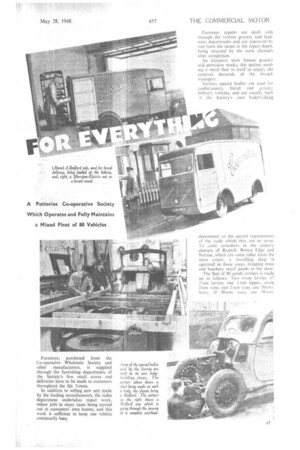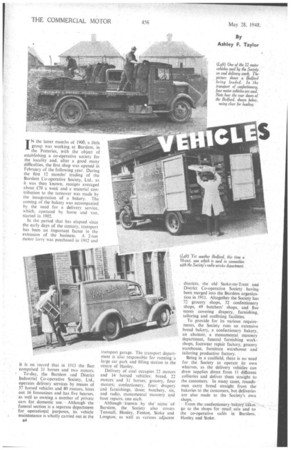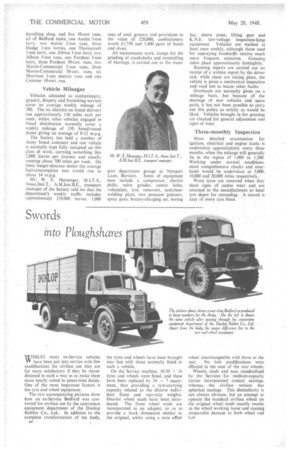A Potteries Co-operative Society Which Operates and Fully Maintains a Mixed Fleet of 80 Vehicles
Page 39

Page 38

Page 40

If you've noticed an error in this article please click here to report it so we can fix it.
By Ashley F. Taylor IN the latter months of 1900, a little group was working at Burslem, in the Potteries, with the object of establishing a co-operative society for the locality and, after a good many difficulties, the first shop was opened in February of the following year During the first 12 months' trading of the Burslenn Co-operative Society, Ltd., as it was then known, receipts averaged about £70 a week and a material contribution to the turnover was made by the inauguration of a bakery. The coming of the bakery was accompanied by the need for a delivery service, which, operated by horse and van, started in 1902.
In the period that has elapsed since the early days of the century, transport has been an important factor in the extension of the business. A 2-ton motor lorry was purchased in .1912 and it is on record that in 1913 the fleet comprised 31 horses and two motors.
To-day, the Burslem and District Industrial Co-operative Society, Ltd.. operates delivery services by means of 57 horsed vehicles and 80 motors, hires out 16 limousines and has five hearses. as well as owning a number of private cars for domestic use. Although the funeral section is a separate department for operational purposes, its vehicle maintenance is wholly carried out at the B4 transport garage. The transport department is also responsible for running a large car park and filling station in the centre of Hanley.
Delivery of coal occupies 22 motors and 14 horsed vehicles; bread, 22 motors' and 31 horses; grocery, four motors; confectionery. four; drapery and furnishings, three; butchery, six. and radio, monumental masonry and boot repairs, one each, Although known by the name of Burslem. the Society also covers Tunstall, Hanley, Fenton. Stoke and Longton, as well as various adjacent districts, the old Stoke-on-Trent and District Co-operative Society having been merged into the Burslem organization in 1911. Altogether the Society has 72 grocery shops, 32 confectionery shops, 49 butchers' shops, and five stores covering drapery, furnishing, tailoring and outfitting facilities.
To provide for its various requirements, the Society runs an extensive bread bakery, a confectionery bakery, an abattoir, a monumental masonry department, funeral furnishing workshops, footwear repair factory, grocery warehouse, furniture warehouse and tailoring productive factory.
Being in a coalfield, there is no need for the Society to operate its own wharves, as the delivery vehicles can draw supplies direct from 11 different collieries and deliver them straight to the customers: In many cases, roundsmen carry bread straight from the bakeries to the customers, but deliveries are also made to the Society's own shops.
• From the confectionery. bakery' cik es go to the shops for retail sale and to the co-operative cafe's in Burslem. Hanley and Stoke. Furniture, purchased from the Co-operative Wholesale Society and other manufacturers, is supplied through-the furnishing departments of the Society's five retail stores and deliveries have to be made to customers throughout the Six Towns.
In addition to selling new sets .made by the leading manufacturers, the radio department undertakes repair work, minor jobs in many cases being carried out at customers' own homes, and this work is sufficient to keep one vehicle continually busy
Footwear repairs are dealt with through the .various grocery and footwear departments and are conveyed by van from the shops to the repair depot, being returned by the same channels after completion.
An extensive store houses grocery and provision stocks, this section needing a small fleet in itself to supply the constant demands of the branch managers.
Various special bodies are used for confectionery, bread and grocery delivery vehicles, and are usually built in the Society's own bodybuilding department to the special requirements of the trade which they are to serve. To assist customers in the country districts of Bagnall, Brown Edge and Norton, which arc some miles from the main centre, a travelling shop is operated in those areas, bringing meat and butchery small goods to the door. The fleet of 80 goods; carriers is made up as follows: Two 4-ton lorries. 17 3-ton lorries, one 3-ton tipper, seven 3-ton vans, two 2-ton vans, one 30-cwt. lorry, 18 30-cwt. vans. one 30-cwt. travelling shop, and five 10-cwt vans, all of Bedford make, one Austin 3-ton lorry, two Austin 2-ton vans, three Dodge 3-ton lorries, one Thornycroft 3-ton lorry, one Albion 3-ton lorry, two Albion 3-ton vans, one Fordson 3-ton lorry, three Fordson 30-cwt. vans. two Morris-Commercial 2-ton vans, three Morris-Commercial 30-cwt. vans, six Morrison 1-ton electric vans and one Commer 10-cwt. van.
Vehicle Mileages
Vehicles allocated to confectionery, giocery, drapery and furnishing services cover an average weekly mileage of 200. The six electrics on bread delivery run approximately 110 miles each per week, whilst other vehicles engaged in bread distribution normally cover a weekly mileage of 150. bread-round duties giving an average of 8-12 m.p.g.
The Society has held a number of Army bread contracts and one vehicle is normally kept fully occupied on this class of work, carrying something like 2.000 loaves per journey and usually running about 700 miles per week. On these longer-distance duties the average fuel-consumption rate would rise to about 14 m.p.g.
Mr. W. E. Messenger, M.I.T.A., Assoc.Inst.T., A.M.Inst.B.E., transport manager of the Society told me that the department's weekly traffic includes approximately 210.000 loaves, 1,000 tons of coal, grocery and provisions to the value of £20,000, confectionery worth £1,750 and 1,400 pairs of boots and shoes.
All maintenance work, except for the grinding of crankshafts and remetalling of bearings, is carried out at the trans
port department garage at Newport Lane, Burslem. Items of equipment here include a compressor. electric drills, valve grinder, centre lathe, vulcanizer, tyre removers, acetylenewelding plant, two pressure greasers, spray guns, battery-charging set. boring
bar, sleeve press, lifting gear and K.N.E. low-voltage inspection-lamp equipment. Vehicles are washed at least once weekly, although those used for conveying foodstuffs receive much more frequent attention. Greasing takes place approximately fortnightly.
Running repairs are carried out on receipt of a written report by the driver and, while these are taking place, the vehicle is given a mechanical inspection and road test to locate other faults.
Overhauls are normally given on a mileage basis, but because of the shortage of new vehicles and spare parts, it has not been possible to carry out this policy as strictly as would be liked. Vehicles brought in for greasing are checked for general adjustment and signs of wear.
Three-monthly Inspection
More detailed examination for ignition, electrical and engine faults is undertaken approximately every three months, when the mileage will generally be in the region of 1,000 to 1,200. Working under normal conditions. more comprehensive checks and overhauls would be undertaken at 5,000, 10,000 and 20,000 miles respectively.
Worn tyres are removed when they show signs of undue wear and are returned to the manufacturers or local tyre depot for retreading. A record is kept of every tyre fitted.




















































































